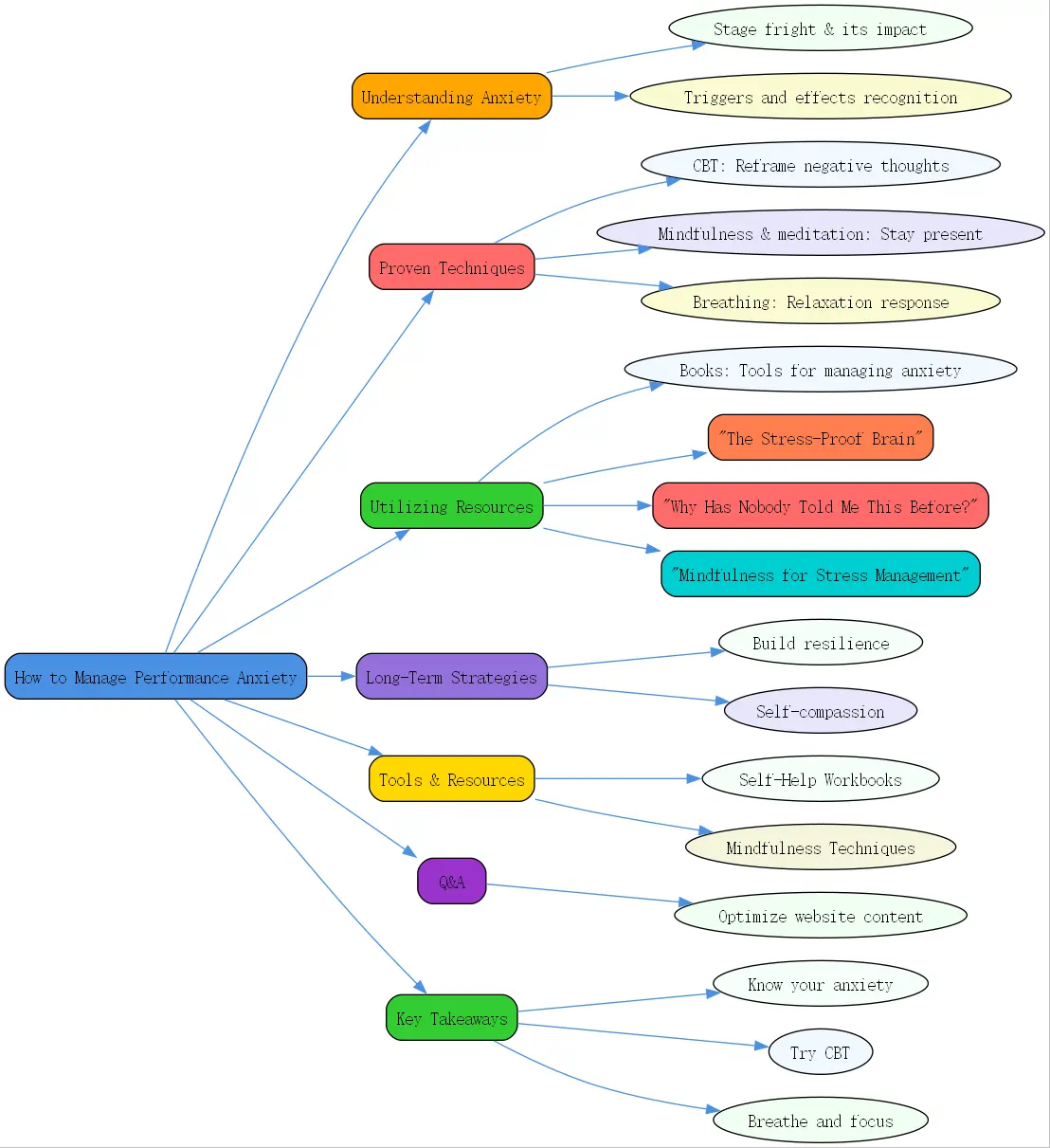Have you ever felt your heart racing before a big presentation or your hands trembling during an important exam? You’re not alone. Performance anxiety affects millions of people worldwide, but the good news is, there are effective ways to tackle it. At BrainTalking, we believe in providing actionable advice to help you overcome mental health challenges. In this article, we’ll explore expert-backed strategies to help you learn how to manage performance anxiety and perform at your best. Whether it’s stage fright, test nerves, or social stress, you’ll find practical tips and resources to stay calm and confident.
Understanding Performance Anxiety and Its Impact

Performance anxiety, often called stage fright, is the fear or nervousness that strikes before or during a performance. It could be giving a speech, taking a test, or even attending a social event. This anxiety shows up in physical ways鈥攍ike sweating, shaking, or a dry mouth鈥攁nd mentally, with negative thoughts or fear of failure. Knowing how it affects you is the first step to managing it.
Psychologically, performance anxiety can sap your confidence and muddle your focus. You might doubt your skills or obsess over others’ opinions. Physiologically, it kicks off the fight-or-flight response, flooding your body with stress hormones like adrenaline and cortisol. While this reaction helped our ancestors survive threats, it’s less useful when you’re facing a PowerPoint slide instead of a predator. It can leave you jittery and unsettled.
What triggers this anxiety? Common culprits include fear of judgment, perfectionism, lack of preparation, or a past flop. Maybe you bombed a speech once, and now every stage feels like a minefield. Recognizing these triggers lets you tackle them head-on. For instance, if perfectionism drives your nerves, setting realistic goals can ease the pressure.
Proven Techniques to Manage Anxiety
One of the best ways to handle performance anxiety is with Cognitive Behavioral Therapy (CBT) techniques. CBT helps you spot and reframe negative thoughts. Caught thinking, 鈥淚’m going to fail?? Swap it for, 鈥淚’ve prepped, and I can do this.??This shift can dial down anxiety fast. Curious about CBT? Check out our guide on CBT for anxiety.
Mindfulness and meditation also work wonders. They keep you anchored in the now, stopping worries from spiraling. Try this: Close your eyes, breathe deeply, and focus on the air moving in and out. If your mind drifts, gently nudge it back. Just a few minutes daily can sharpen your calm. It’s simple but powerful.
Breathing techniques tackle the physical side of anxiety. Deep, diaphragmatic breathing鈥攊nhaling for four, holding for four, exhaling for four鈥攖riggers your body’s relaxation response. It slows your heart rate and eases tension. The American Psychological Association notes anxiety disorders are top mental health issues in the U.S. (APA website), making these skills a must-have.
Utilizing Resources: Books on Stress and Anxiety Management
Books can deepen your understanding and offer new tools for managing anxiety. Here are three standout picks tailored to performance struggles.
“”The Stress-Proof Brain”” by Melanie Greenberg blends neuroscience, mindfulness, and CBT to rewire how you handle stress. Written by a clinical psychologist, it’s perfect for performance anxiety, teaching you to respond positively instead of panicking. You’ll learn to calm your mind and build resilience.
“”Why Has Nobody Told Me This Before?”” by Dr. Julie Smith delivers practical, compassionate advice from a clinical psychologist. It tackles anxiety with exercises and worksheets, making it a hands-on guide. For performance nerves, it’s a goldmine of tips to boost confidence and ditch perfectionism.
“”Mindfulness for Stress Management”” by Robert Shaker offers 50 easy mindfulness practices to lift your mood and soothe stress. This workbook covers various stressors鈥攍ike work or health鈥攖hat can fuel performance anxiety. It’s a practical way to weave calmness into your routine.
At BrainTalking, we’ve handpicked these resources to help you manage performance anxiety effectively.
Long-Term Strategies for Overcoming Anxiety
Quick fixes are great, but lasting change needs a solid foundation. Let’s look at long-term strategies.
Building Resilience and Self-Compassion
Self-care is non-negotiable for keeping anxiety in check. Regular exercise鈥攍ike a brisk walk or yoga鈥攃uts stress levels. Eating well, sleeping enough, and unwinding with a book or music nurture your mind. Small habits add up to big relief.
Self-compassion is a game-changer. Instead of beating yourself up over a shaky performance, try kindness. Tell yourself, 鈥淚t’s okay to stumble; I’ll grow from this.??This softens the self-pressure that fuels anxiety and helps you recover faster.
A supportive circle matters too. Surround yourself with positive people who get it鈥攆riends, family, or even a therapist. Don’t shy away from professional help if anxiety overwhelms you. It’s a strength, not a weakness, to seek support.
Practical Steps for Managing Specific Anxiety Types
Anxiety isn’t one-size-fits-all. Here’s how to handle specific types.
Wondering how to manage driving anxiety? Exposure therapy can help. Start small鈥攄rive a quiet street鈥攖hen build up to busier roads. Pair it with deep breathing to stay calm. Over time, the fear fades.
For how to manage ADHD anxiety, structure and mindfulness are key. Set clear routines for tasks and breaks. Use mindfulness to stay present鈥攍ike a quick breathing exercise when overwhelm hits. It keeps anxiety from piling on top of ADHD chaos.
To learn how to manage anxiety broadly, combine CBT and Acceptance and Commitment Therapy (ACT). CBT rewires negative thoughts, while ACT helps you accept feelings and act on your values. Both ease performance jitters.
Effective Tools and Resources for Anxiety Management
Beyond techniques, self-help books offer structured support. Here are some gems.
Exploring Self-Help Workbooks and Guides
“”The Anxiety and Phobia Workbook”” by Edmund Bourne is a thorough guide to anxiety disorders. It covers CBT, exposure therapy, and relaxation methods. For performance anxiety tied to phobias or panic, it’s a roadmap to freedom.
“”Feeling Good: The New Mood Therapy”” by David D. Burns uses cognitive therapy to shift distorted thoughts. Written by a psychiatry pioneer, it includes exercises to build a positive mindset鈥攃rucial for facing performance pressure.
“”The Worry Trick”” by David A. Carbonell tackles excessive worry with CBT and ACT. If pre-performance overthinking is your hurdle, this book’s clever strategies can break the cycle.
Mindfulness and Acceptance Techniques for Anxiety Relief
Mindfulness and acceptance can transform your anxiety game.
“”The Happiness Trap”” by Russ Harris is an ACT guide to accepting thoughts without fighting them. It’s about living by your values, not battling nerves鈥攁 fresh take for performance anxiety.
“”DARE: The New Way to End Anxiety”” by Barry McDonagh pushes you to face fears with the DARE method. For driving anxiety or stage fright, it builds confidence through bold action.
“”Rewire Your Anxious Brain”” by Catherine M. Pittman and Elizabeth M. Karle dives into neuroscience. It explains anxiety’s brain roots and offers rewiring tactics鈥攊deal for understanding and mastering performance stress.
Q&A Section
Q: How can I optimize my website content to help users manage performance anxiety?
A: Create high-quality, helpful content that meets users’ needs. Naturally weave in keywords like “”how to manage performance anxiety”” to boost search rankings. Make your site easy to navigate with clear menus and accessible tools. Add internal links to related articles鈥攍ike our mindfulness guide鈥攁nd external links to trusted sources, like the National Institute of Mental Health (NIMH website). Craft meta descriptions that hook readers and use alt text for images. Valuable content builds trust and SEO strength.
Key Takeaways
- Know your anxiety: Spot triggers and effects of performance anxiety.
- Try CBT: Reframe negative thoughts for calmer vibes.
- Breathe and focus: Use mindfulness and breathing to stay grounded.
- Read up: Explore expert books for deeper strategies.
- Build strength: Embrace self-care and compassion long-term.
- Get support: Lean on positive people or pros when needed.




